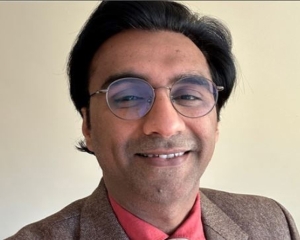The celebration of the Azadi Ka Amrut Mahotsav-75 years of freedom struggle should lead us to seriously revisit all the promises we made during the freedom struggle and later, in the implementation of constitutional mandates, especially the most important mandate— Article 21—which says about Right to Life and Personal Liberty. The realization of Article 21 of the Constitution can only be possible with ensuring universal food security, primary education and universal healthcare for all.
Everyone's life is meaningful, complete and the living must be dignified. The Right to Livelihood is part of the Right to Life as interpreted by the Supreme Court. In this context, food security is one of the most basic and non-negotiable areas of rights which is very fundamental to human existence. Food security for all has been quite challenging with changing global socio-economic and political scenario. In spite of growing economic inequality, it is expected by global leaders that the universal food security for all may be ensured by 2030. But the post Covid-19 has made the target more challenging. Mostly, a sizable population in Africa, South and West Asia, Latin America, Caribbean and Oceania has been reeling under acute poverty, hunger and malnutrition. India ranks 71 out of 113 countries of the world in global Food Security Index, 2021. The report observed deterioration in global food environment. Countries such as China are much ahead of India and countries in top of the index are Ireland, Australia, UK, USA, Finland, Switzerland, Nederland, Canada, Japan, and France.
The Food Security Index measures food security based on factors such as affordability, availability, quality, safety, natural resources and resilience. The Government of India has many schemes such as the National Food Security Act 2013, Eat Right India Movement, POSHANA Abhiyan, Food fortification, ICDS and national innovation in climate resilient agriculture to arrest the growing hunger and malnutrition in the country, especially among the vulnerable communities while increasing the production in any kind of adverse situation. The Eat Right India Movement by the Food Safety and Standard Authority of India (FSSAI) aims to combat negative nutritional trends that impact the spread of life- style diseases. Rice fortification has been initiated in India to counter malnutrition. The rice fortification has been done by coating, dusting and extrusion to add iron, zinc, folic acid, vitamin A and B12.
The State of Chhattisgarh has already launched the fortified rice scheme under a targeted public distribution system. Odisha is one of the poorest States of India having 80 per cent of its population as per 2011 census depending on free rice distribution schemes (Re 1) under the National Food Security Act 2013. Even some interior parts of the State and more particularly, the vulnerable social groups and ethnic communities still are more prone to hunger and malnutrition. The State Government runs a food security scheme (SFSS) which provides 5kg of rice at Re 1 added to the NFSA beneficiaries selected as per 2011 Census. This is not good for the economic, social and political health of a State having a major part of its population depending on free food schemes. Odisha must have to overcome the situation and ensure food security.
The State also has a high risk of malnutrition. Considering the issues of malnutrition, the NITI Aayog has identified 15 districts of the country including the tribal-dominated Malkangiri district to implement fortified rice schemes and the Food Corporation of India (FCI) has been asked to coordinate with the rice mills for the purpose. Added to these steps, the Central Government also has launched the national innovation in climate resilient agriculture to improve preparedness to cope with challenges of climate change and its impact on agriculture sector and food production.
Odisha is getting more vulnerable with climate change impacts which has a bearing on agriculture and food security of the vulnerable social groups. Along with food security the other two important areas connected to the Right to Life and Dignity are universal primary education and universal healthcare which are equally important to build quality human resources and a civilized society. Education is one of the key means of social and economic transformation of any society. Historically, primary education has been neglected in the country including Odisha with some States such as Kerala as an exception. Even today, in spite of the RTE Act, a target to implement universal, free, and compulsory primary education is still miles away. Many industrially developed countries of the world such as China have started with building universal primary education. A UNESCO report on universal education goals says India will achieve universal primary education by 2050.
A recent trend in education shows a gradual withdrawal of the Government from the responsibility of providing primary education and encouraging the private business in education sector. There are varieties of schools lacking uniformity and universal access in many ways. The school infrastructure, teachers and teaching methodology and many related things vary and also status wise, they lack equality. The education system discriminates against the poor and people of lower social strata to access education as equals. The so-called residential schools ghettoize the children of backward communities, low caste and ethnic groups in the name of separate schools and residential places. When will the children of all castes and classes sit together, stay together and read together in common schools for all? This is now a million dollar question. Many of our special residential schools for the poor and excluded groups are socially non-inclusive and lack universality. Ideally, there must be a common school system and all the students must avail equal facilities provided by the State without discrimination in any form.
Similarly, in the health sector many countries such as Cuba, Brazil, China and Mexico have moved towards universal basic healthcare and social security facilities for their people. In any civilized country, no one should suffer due to lack of treatment facilities because of his poor financial status. But there has been a tendency towards privatisation of the health sector and reducing the role of Government that leads to depriving a majority of our population of Right to Life because of their social and economic status. The Covid-19 has well exposed our vulnerability in terms of poor public health infrastructure, shortage of doctors, heath workers, medicines and many more which need to be overcome with an approach of universal healthcare for all as a constitutional mandate. The elected Governments at the Center and State must act to respond to the Right to Life and Dignity to become a model for the rest of the world while celebrating legacies of freedom struggle.























